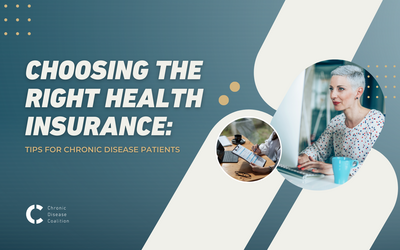
Health insurance is essential for taking care of your health and making sure you can get the medical help you need. It's a safety net that ensures you can pay for healthcare needs, which is especially important if you have a chronic illness.
At the end of each year, open enrollment is the time when people can look at their health insurance plans and make changes to new or existing coverage. For those with chronic illnesses who use their health insurance on a more regular basis, this time is especially important to make sure they have the right coverage. In a recent talk at Chronic University, Casey Meehan from Molina Healthcare gave some useful tips about dealing with open enrollment. Here's what he said:
Know Which Doctors You Can See
When choosing a health plan, it's important to know which doctors are covered by your insurance provider. You can ask your doctor or check the insurance company's website to see if your provider is covered. By ensuring that your provider is contracted with your insurance company, you’ll be able to manage costs more effectively and minimize any disruptions in care.
Look at Different Plans
Different health plans give you different benefits and costs. If you think you won't need to see the doctor a lot, you might pick a plan where you pay more if you do need to see a doctor, but you pay less each month. But if you know you'll need to see the doctor often, you might want a plan that costs more each month but asks you to pay less when you see the doctor.
Understand How Much You Have to Pay
Before your insurance starts to help you, you might have to pay a certain amount first — these are called copays. For some services, you might need to pay a bit every time you visit the doctor. Understanding these costs can help you get ready for your medical expenses.
Find Programs That Help
There are many programs that can help people with chronic diseases manage their healthcare costs. Some insurance companies have special plans or help with certain types of medicine. There are also other companies that can help you find programs that give money to help pay for your medicine. You can ask your insurance company or provider to learn more.
Use Special Savings Accounts
If you enroll in an HSA qualified health plan, you can use a special health savings account (HSA). This option lets you add tax-free money to an account each month so that you can use it to pay for additional medical costs.
Get Help and Advice
If you feel unsure about which health insurance to pick, it's totally okay to ask for help. There are Brokers and Navigators who know a lot about health insurance and can help you understand the different choices. They can look at the options, give you advice, and suggest the best plans for you, at no additional cost to you. Start by going to healthcare.gov where you can search for assisters in your state that can answer your questions and help you get enrolled.
Dealing with open enrollment might seem difficult, especially if you have a chronic disease. But by learning about health insurance, checking which doctors are covered, looking at different plans, and finding programs that help, you can make smart choices about your coverage. Don't forget to ask for help if you need it!
Missed this Chronic University session? See the full recording here.